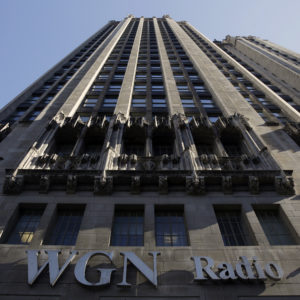Another well-established conservative news outlet is asking the Federal Communications Commission to deny the pending $3.9 billion Sinclair-Tribune merger, a potential right-leaning broadcasting behemoth that would reach the largest television audience in America.
The Blaze, the online, television and radio news outlet founded by conservative political pundit Glenn Beck, filed its opposition to the merger in the last round of comments sought by the FCC this week on whether to approve the deal.
In a joint filing with One America News Network — a cable network backing the Trump administration’s Republican agenda — and several other groups, The Blaze’s chief financial officer Misty Kawecki said Sinclair-Tribune failed to prove the transaction will benefit consumers — a requirement for FCC approval.
Sinclair-Tribune initially submitted just three pages to the FCC outlining how the merger would be in the public interest. After coming under heavy criticism from major providers in the satellite, cable and wireless industries, public interest groups, a former FCC commissioner, and even comedian John Oliver of the hit HBO series “Last Week Tonight,” Sinclair replied arguing critics failed to demonstrate the merger wasn’t in the public interest.
The Blaze and others said mergees have it backwards, and that according to FCC standards, it’s incumbent upon Sinclair-Tribune “to prove to the commission that the proposed transaction is in the public interest.”
“[Sinclair-Tribune] want to flip the burden of proof because they simply cannot justify this transaction under the public interest standard,” reply comments filed this week by The Blaze and others read.
Newsmax, the conservative news website whose founder, Christopher Ruddy, is a close associate of President Donald Trump, opposed the transaction in the first round of comments.
“[T]he level of media concentration proposed by this transaction will homogenize the content available to U.S. consumers, eliminate unique viewpoints and reduce press diversity, especially in the delivery of local news,” the outlet’s filing reads.
It and others warn if the deal gets regulatory approval, Sinclair would own more than 200 television stations, including over 130 stations affiliated with the four biggest broadcast networks in the U.S.; ABC, CBS, NBC and Fox. That would let Sinclair, which has received criticism for its right-leaning editorial news content, reach 72 percent of American households and own TV stations in 108 of all 210 TV markets, including 40 out of the top 50.
For The Blaze, Newsmax, and One America News Network, that means major competition for conservative audiences and ad dollars. The combined Sinclair-Tribune audience would reach 2.2 million American households, more than prime time cable Fox News programs like “The Five” and “Tucker Carlson Tonight.”
The New York Times reports staving off the merger could also create a timely opportunity for conservative outlets to expand.
“With a president in the White House who has consistently tried to discredit the mainstream news media, and with Fox News, the longtime king of conservative programming, still powerful but having lost some of its biggest stars, conservative news outlets have a unique opportunity to extend their influence,” the Times reported in August.
Craig Aaron, the president of the consumer advocacy organization Free Press, a group opposed to the merger, goes on to tell the paper “[e]ven though they may be ideologically aligned, Newsmax and others see Sinclair is going to be so big that they’ll swallow up ad dollars and starve the conservative competition.”
That could be especially true for The Blaze. Deadline reported late Thursday The Blaze laid off more than 20 percent of its staff at the website and Beck’s production company Mercury Radio Arts. Beck attributed the cuts to “structural challenges,” adding “[w]e are not PBS. No government institution is going to write us a giant check.”
Critics of the merger also warn Sinclair will have the power to raise prices for its programming across the U.S., incentive to scale back local news broadcasts and hinder efforts to repurpose some broadcast airwaves into bands for mobile wireless.
Sinclair argues allowing broadcaster to merge is the only way they can compete with online streaming platforms like Netflix, that its resources will supplement local newsrooms with nationally generated content, and that critics of the media conglomerate’s political content run afoul of the First Amendment.

